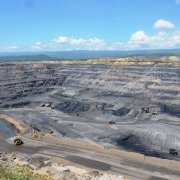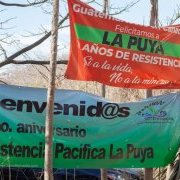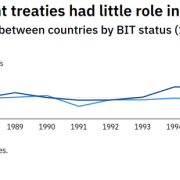20-Sep-2022
Institute for Policy Studies
International organizations appeal to Colombia’s highest court over human rights violations at one of the largest open pit coal mines in the world.
14-Sep-2022
State of Power
The ECT Secretariat, whose survival depends on continuation of the treaty, continues to lobby these countries to take additional steps towards acceding to the Energy Charter Treaty.
12-Sep-2022
Business & Human Rights Resource Centre
Now the Covid-19 pandemic is no longer in the headlines in many parts of the world, the risk corporations will use investment treaties to claim compensation from governments to cover their losses during these exceptional times is increasing.
8-Sep-2022
The Conversation
It’s a portent of claims Australia may face from British companies invested in Australia’s fossil-fuel industries if the United Kingdom gets its way and joins the Comprehensive and Progressive Agreement for Trans-Pacific Partnership.
5-Sep-2022
The Korea Times
The total amount of claims asked by claimants against the Korean government exceeds $1.2 billion.
24-Aug-2022
Junior Mining Network
Montero Mining and Exploration Ltd. is seeking compensation of CAD$ 90 million from Tanzania over the expropriation of the Wigu Hill Rare Earth Element Project.
23-Aug-2022
Trade Justice Network
We Canadian and German civil society organizations express our continued opposition to CETA, which protects corporate interests at the expense of climate, environmental and social action and democratic decision-making.
22-Aug-2022
BNE Intellinews
The half-brother of ousted UK Prime Minister Boris Johnson says he will bring a $50mn lawsuit against Mongolia to try to recover an investment into a mining project that went horribly wrong.
22-Aug-2022
Slovenia Posts English
Ascent Resources initiated an arbitration dispute in which it is demanding half a billion euros due to Slovenia’s request that an environmental impact assessment should be carried out before fracking in Petišovci.
28-Jul-2022
Sierra Nevada Ally
However, locals feel latent tension that the imminent consultation process or the arbitration suit could revive earlier threats, violence, and legal persecution from company employees and contractors.
27-Jul-2022
Investigate Europe
European governments are still considering withdrawal from the Energy Charter Treaty, despite the EU Commission’s efforts to modernise the controversial pact, documents leaked to Investigate Europe reveal.
18-Jul-2022
Energy Monitor
Despite warnings that new oil and gas fields must be banned for the world to decarbonise by 2050, treaty signatories will protect fossil fuel production for at least another decade.










